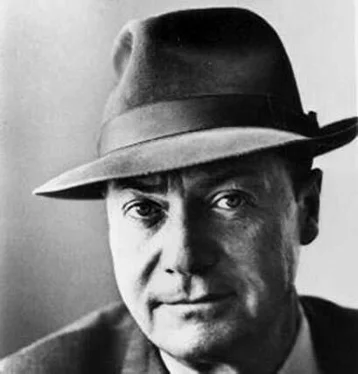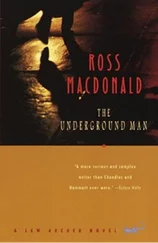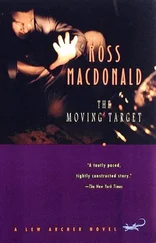“Don’t call me Fern. I hate that name.” There were sudden tears in her eyes. “I hate everything connected with that name. I hate myself.”
“You’ll hate yourself more if you don’t put down that gun. Shoot me and it all starts over again. The cops will be on your trail, Angel’s troopers will be gunning for you.”
Now only the cot was between us, the cot and the unsteady gun facing me above it.
“This is the turning point,” I said. “You’ve made a lot of bum decisions and almost ruined yourself, playing footsie with the evilest men there are. You can go on the way you have been, getting in deeper until you end up in a refrigerated drawer, or you can come back out of it now, into a decent life.”
“A decent life? Here? With my father married to Mabel?”
“I don’t think Mabel will last much longer. Anyway, I’m not Mabel. I’m on your side.”
I waited. She dropped the gun on the blanket. I scooped it up and turned to Donny:
“Let me see that note.”
He disappeared through the kitchen door, head and shoulders drooping on the long stalk of his body.
“What could I do?” the girl said. “I was caught. It was Bart or me. All the way up from Acapulco I planned how I could get away. He held a gun in my side when we crossed the border; the same way when we stopped for gas or to eat at the drive-ins. I realized he had to be killed. My father’s motel looked like my only chance. So I talked Bart into staying there with me overnight. He had no idea who the place belonged to. I didn’t know what I was going to do. I only knew it had to be something drastic. Once I was back with Angel in the desert, that was the end of me. Even if he didn’t kill me, it meant I’d have to go on living with him. Anything was better than that. So I wrote a note to Donny in the bathroom, and dropped it out the window. He was always crazy about me.”
Her mouth had grown softer. She looked remarkably young and virginal. The faint blue hollows under her eyes were dewy. “Donny shot Bart with Bart’s own gun. He had more nerve than I had. I lost my nerve when I went back into the room this morning. I didn’t know about the blood in the bathroom. It was the last straw.”
She was wrong. Something crashed in the kitchen. A cool draft swept the living room. A gun spoke twice, out of sight. Donny fell backwards through the doorway, a piece of brownish paper clutched in his hand. Blood gleamed on his shoulder like a red badge.
I stepped behind the cot and pulled the girl down to the floor with me. Gino came through the door, his two-colored sports shoe stepping on Donny’s laboring chest. I shot the gun out of his hand. He floundered back against the wall, clutching at his wrist.
I sighted carefully for my second shot, until the black bar of his eyebrows was steady in the sights of the .38. The hole it made was invisible. Gino fell loosely forward, prone on the floor beside the man he had killed.
Ella Salanda ran across the room. She knelt, and cradled Donny’s head in her lap. Incredibly, he spoke, in a loud sighing voice:
“You won’t go away again, Ella? I did what you told me. You promised.”
“Sure I promised. I won’t leave you, Donny. Crazy man. Crazy fool.”
“You like me better than you used to? Now?”
“I like you, Donny. You’re the most man there is.”
She held the poor insignificant head in her hands. He sighed, and his life came out bright-colored at the mouth. It was Donny who went away.
His hand relaxed, and I read the lipstick note she had written him on a piece of porous tissue:
“Donny: This man will kill me unless you kill him first. His gun will be in his clothes on the chair beside the bed. Come in and get it at midnight and shoot to kill. Good luck. I’ll stay and be your girl if you do this, just like you always wished. Love. Ella.”
I looked at the pair on the floor. She was rocking his lifeless head against her breast. Beside them, Gino looked very small and lonely, a dummy leaking darkness from his brow.
Donny had his wish and I had mine. I wondered what Ella’s was.
Published as “The Guilty Ones” in Manhunt , May 1953.
A man in a conservative dark gray suit entered my doorway sideways, carrying a dark gray Homburg in his hand. His face was long and pale. He had black eyes and eyebrows and black nostrils. Across the summit of his high forehead, long black ribbons of hair were brushed demurely. Only his tie had color: it lay on his narrow chest like a slumbering purple passion.
His sharp black glance darted around my office, then back into the corridor. His hairy nostrils sniffed the air as if he suspected escaping gas.
“Is somebody following you?” I said.
“I have no reason to think so.”
I had my coat off and my shirt unbuttoned. It was a hot afternoon at the start of the smog season. My visitor looked at me in a certain way that reminded me of schoolteachers. “Might you be Archer?”
“It’s a reasonable conclusion. Name’s on the door.”
“I can read, thank you.”
“Congratulations, but this is no talent agency.”
He stiffened, clutching his blue chin with a seal-ringed hand, and gave me a long, sad, hostile stare. Then he shrugged awkwardly, as though there was no help for it.
“Come in if you like,” I said. “Close it behind you. Don’t mind me, I get snappy in the heat.”
He shut the door violently, almost hard enough to crack the expensive one-way glass panel. He jumped at the noise it made, and apologized.
“I’m sorry. I’ve been under quite a strain.”
“You’re in trouble?”
“Not I. My sister…” He gave me one of his long looks. I assumed an air of bored discretion garnished with a sprig of innocence.
“Your sister,” I reminded him after a while. “Did she do something, or get something done to her?”
“Both, I’m afraid.” His teeth showed in a tortured little smile which drew down the corners of his mouth. “She and I maintain a school for girls in – in the vicinity of Chicago. I can’t emphasize too much the importance of keeping this matter profoundly secret.”
“You’re doing your part. Sit down, Mr.–”
He took a pinseal wallet out of his inside breast pocket, handling it with a kind of reverence, and produced a card. He hesitated with the card in his hand.
“Let me guess,” I said. “Don’t tell me. Does your name begin with a consonant or a vowel?”
He sat down with great caution, after inspecting the chair for concealed electrodes, and made me the gift of his card. It was engraved: “J. Reginald Harlan, M.A. The Harlan School.”
I read it out loud. He winced.
“All right, Mr. Harlan. Your sister’s in some kind of a jam. You run a girls’ school–”
“She’s headmistress. I’m registrar and bursar.”
“–which makes you vulnerable to scandal. Is it sexual trouble she’s in?”
He crossed his legs, and clasped his sharp knee with both hands. “Now how could you possibly know that?”
“Some of my best friends are sisters. I take it she’s younger than you.”
“A few years my junior, yes, but Maude’s no youngster. She’s a mature woman, at least I’d always supposed that she was mature. It’s her age, her age and position, that make this whole affair so incredible. For a woman of Maude’s social and professional standing, with a hundred virginal minds in her charge, suddenly to go mad over a man! Can you understand such behavior?”
“Yes. I’ve seen enough of it.”
“I can’t.” But a faint, attractive doubt softened his eyes for a moment. Perhaps he was wondering when some long overdue lightning might blast and illuminate him. “I’d always supposed that the teens were the dangerous age. Perhaps after all it’s the thirties.” One hand crawled up his chest like a pallid crab and fondled the purple tie.
Читать дальше












